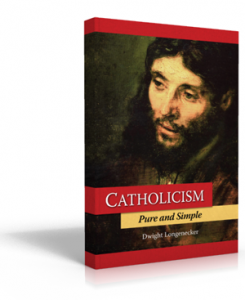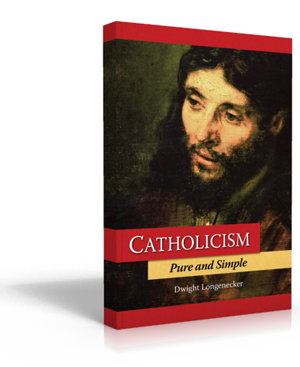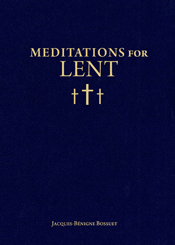
Click for More Information
A cynical person has written, “It is impossible to communicate without being misunderstood.” That’s going a bit far, but I know what he means! If it is difficult to communicate about every day, ordinary things, how much harder it is to communicate abstract ideas about the Catholic faith!
C. S. Lewis wrote an essay in 1961 about the basic principles of communication for those trying to talk about the faith. He says we have to ‘translate’ the faith into everyday language for people. We forget that, as Catholics, we use a special language when talking about our faith. Non-Catholics don’t understand our specialized lingo, and an increasing number of Catholics don’t either.
We use five categories of specialized religious language, and the good evangelist and apologist will understand them and not only avoid the special language, but translate it for his reader or listener. The first category of religious language we use is theological. We toss terms about like “Immaculate Conception” and “Double Procession of the Holy Spirit” or refer to the filioque clause. This won’t do. We need to use simple language, and explain what these terms mean.
The second category of special language we use is liturgical language. People don’t know what an ‘ordo’ is and don’t much care about the difference between a tunicle and a dalmatic. They don’t know what the ‘epiclesis’ is and don’t know what we’re talking about when we spout words like ‘ad orientem’ or ‘versus populum’. When we talk about our worship we need to use ordinary language. Likewise, when we use devotional and spiritual talk or the specialized jargon of canon law and the intricacies of the church hierarchy.
In additional to getting rid of insider jargon, Lewis says we must watch out for high brow language, academic references, and literary and cultural allusions. It’s not much good trying to communicate the faith if we quote Jean Paul Sartre in French, refer to ‘the Greek text’ and refer to the novels of Dostoevsky. These references are often included only so the communicator can show off, and when he does his listeners are intimidated and put off the message.
C. S. Lewis says we must try to translate all of this religious talk into a language that the plumber or house cleaner would understand. I might add that if we get the plumber or house cleaner to understand the banker and the lawyer we know might just understand as well!
I have recently re-written a book where I have tried to take Lewis’ advice to heart. In Catholicism Pure and Simple I set out to explain the existence of God, and move through the story of Jesus Christ, the church and sacraments in a way that everyone can connect to. I avoided churchy jargon, theological lingo and high brow references. There are no footnotes or academic references. It’s Catholicism straight and true.
Something happened as I wrote and re-wrote which C. S. Lewis pinpoints. He says that this process of ‘translating’ the faith in a ‘pure and simple’ way helps us to understand how communication works. First of all, it makes you grateful for the jargon and specialized lingo. The specialized lingo has a vocabulary that is useful and one can answer the question briefly and simply. Translating and explaining takes up a lot more words. So, for example, the term ‘immaculate conception’ properly understood says in two clear words what you might need two paragraphs to explain simply.
Secondly, in the process of ‘translation’ you come to understand and appreciate what you are communicating in a much deeper way. They say the way to learn something is to teach it. So it is with translating special religious language for others: as you go through that process you come to know what you’re talking about. Lewis says, “If you can’t explain what you believe to a sensible, ordinary person, then you don’t really understand it very well yourself.”
Lewis observes elsewhere that it is comparatively easy to study a bit and learn the insider jargon and have discussions at an academic level about theology, liturgy, spirituality and church life. The real challenge is to translate all that for others in a way that is motivating, encouraging and down to earth. It’s complicated and messy. It’s difficult to communicate without being misunderstood. To paraphrase Oscar Wilde, the effort to make Catholicism pure and simple is rarely pure and never simple.
Fr Dwight Longenecker is the parish priest of Our Lady of the Rosary Church in Greenville, South Carolina, and the author of many articles and books on the Catholic faith. Visit his blog and website at www.dwightlongenecker.com
Like Fr. Longenecker’s Facebook page: http://www.facebook.com/FrDwightLongenecker
Please help us in our mission to assist readers to integrate their Catholic faith, family and work. Tell your family and friends about this article using both the Share and Recommend buttons below and via email. We value your comments and encourage you to leave your thoughts below. Thank you! – The Editors














